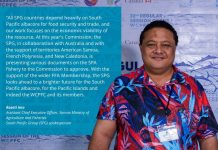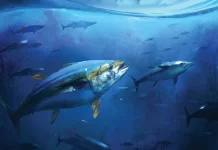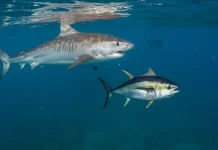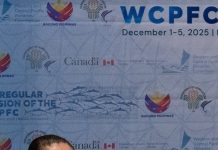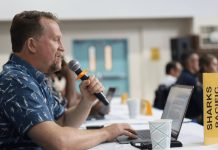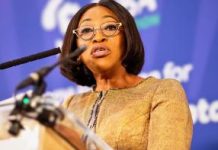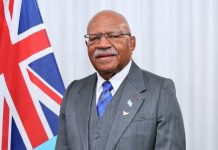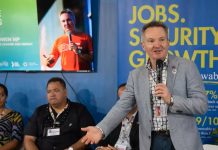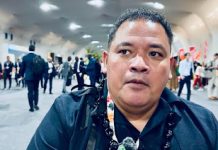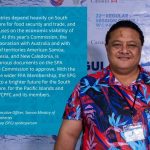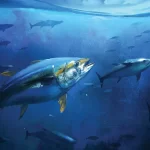The Secretariat of the Pacific Community (SPC) launched the Women in Energy Strategy with the United States Department through the Bureau of Energy Resources and the US Embassy in Suva, in October.
Pasifika Environews spoke to the U.S Department of State Bureau of Energy Resources Deputy Assistant Secretary, Laura Lochman.
1.Could you elaborate on the Women in Energy Strategy that has been launched for the Pacific?
This is something that the Bureau of Energy Resources launched here in Fiji and the eventual idea is that it expands out to other parts of Asia and then eventually globally. But essentially, the premise is that we are facing some very significant challenges related to energy and climate globally. We need to be taking care of our energy security now and moving towards use and adoption of more innovative and less carbon producing technologies. For these transitions to happen, we need everyone involved. We need everyone’s contribution that includes women, and in every stage of the sector, we’re talking about in education, and getting technical training in managing systems and being the technicians on systems, in deciding how these technologies are deployed within communities, on boards of companies and ministers. We need women’s contributions across all those parts of the sector, if we’re going to come up with the solutions that we need that are appropriate for communities and countries and that are sustainable.
2.Why is this of importance to the Pacific?
We believe that it made sense to start here, because there are so many very strong advocates for climate change, and on energy transition, and the need to move ahead. In the Pacific, you’re living the frontline effects of the changes in climate. You’ve been very articulate advocates on the international stage for greater action globally on glide climate change. So, for us, it made a lot of sense to tap into that and to have this be the place where we launched the initiative.
3.Can you talk about some of the expected outcomes of the initiative and some of the challenges you are anticipating in the implementation of this strategy?
This is an initial conversation that we’ve started, and it will be a sustainable conversation where we’ll keep it going. A lot of these efforts that we’re talking about will need to be long term efforts. You need time to, for example, in the education system, to change the mindset for females to not only be encouraged, but for them to see. Oh, there are some role models in the energy sector. I see that woman has been successful in getting into the sector and being a part of it and that is something I can aim towards. Now that takes time. So, these have to be initiatives that we keep working on. But right now, we’re trying to identify some of the baselines, what is the current experience in these in these island countries? What are the specific obstacles or roadblocks that we have to overcome? Then what are the options for action?
The hardest part of these types of efforts is to come up with that baseline of information, to really identify what the issues are in each specific place. They’re unique. For example, here on every island, they have a unique mix of needs on the climate resilience and clean energy front. So, to learn what those are, that’s the first step and to talk to people on the ground and get that view of what the realities are and what pieces are missing? Where might we be helpful in filling in those pieces? And that’s challenging. It takes time and effort. We’ll continue to work through our embassies, and through visits like this to do just that.
4.How do you choose communities or rather women that will be involved in the strategy? Are they from rural or urban communities or from both?
We worked with the SPC, so they’ve been instrumental in helping us. They’ve been our partners the whole way in this. They know they have contexts and all the different governments and communities, and they were able to help identify participants. It’s a mixture of both urban and rural communities. A lot of the conversation has been about the outer islands because it’s a systemic strategy. It really is the body at every level
5.Which countries are you targeting? Are the initiatives similar or different?
In the past, we have worked with individual island states here as well, we worked with in the Federation of Marshall Islands, we worked in Tuvalu previously. There are countries in which we have had for years’ programmes and activities. Those will continue, and we keep identifying new options. That’s part of coming to the region. It’s part of that sort of fact finding: what are the areas in which we might be helpful on these specific islands? What programs do we have to bring to that? We’ve just announced the biogas program, but then there are deputy Secretary also in when she was in Tonga, she signed a separate grant that was for the solar powered freezer project. We’ll continue to identify those individual opportunities that are right for the circumstances, circumstances on those islands.
6.Is this initiative part of achieving Sustainable development goal?
Yes, it is. Not just in the energy sector but across the board. We need diversity and inclusion in all our economic and social sectors, if we’re going to come up with innovative, appropriate solutions that will help us move forward across the board.
7.Who will you work with to promote or implement this strategy?
We’ll have multiple partners as we had in the past. We work through our embassies in the region, and they’ve got connections all over the islands as well. So, they point us in the right direction and identify specific partners, but the regional organisations we work with, the whole architecture here. The infrastructure that is picked will continue to work through those regional groupings, then also directly with individual governments. We coordinate with the multilateral development banks as well.
8.For you personally, do you have a life story or a motivation that is the driver of your ambition to see more Pacific women in energy?
I’m a woman in energy and I would love to see many more women in the energy sector. Many years ago, I started working within the diplomatic service on energy policy issues and I found them fascinating. They’re so fundamental, we can’t turn on a light switch at home, we can’t power our factories, we can’t have light in our schools, we can’t do any of these things, unless we have energy. We take it for granted, oftentimes. So, when you really start getting into learning about this sector, you realize how fundamental it is to absolutely every aspect of life. So, we need to pay attention to it. We need to invest in energy infrastructure, move into new technologies and balanced energy security, with the imperative of addressing the climate crisis. Our prosperity depends on it greatly. I would love to have more women participate in this process of thinking through these questions and how we can answer them….
SOURCE: ENVIRO PASIKA NEWS/PACNEWS



